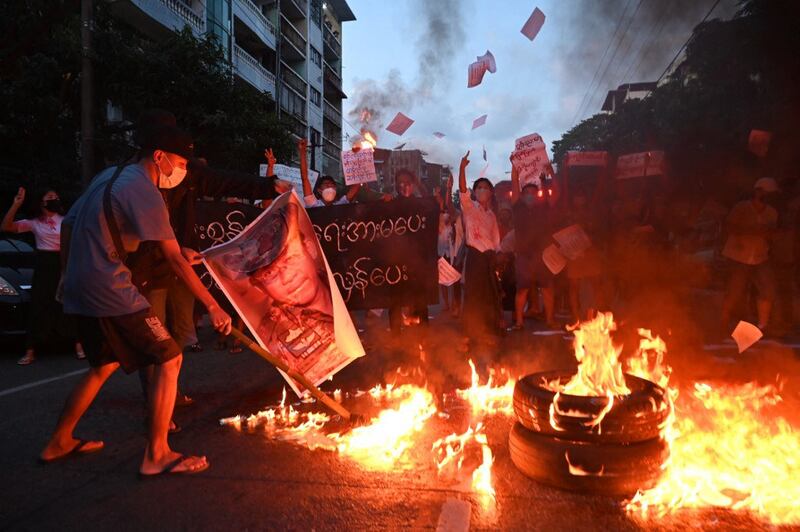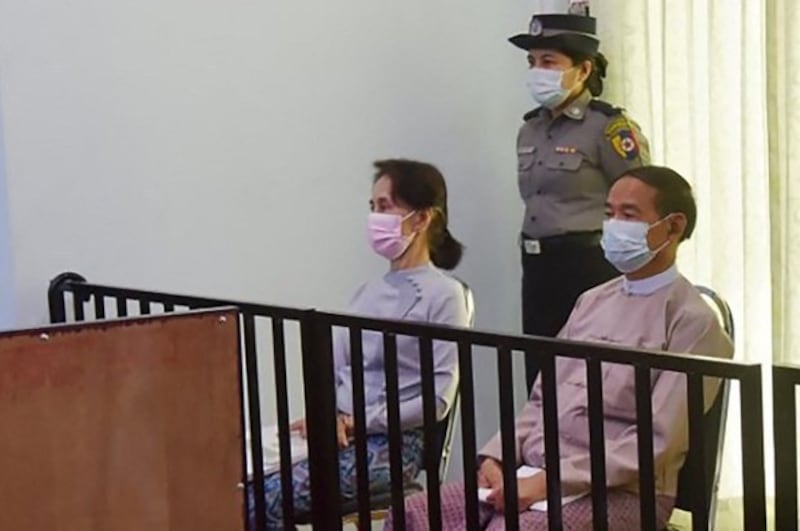A year ago, the commander-in-chief of Myanmar’s military staged a coup d’etat, destroying hopes for democratic reform and pitching the country into chaos. Today, the military is clinging to power through sheer brutality but it is also trying to lay the groundwork for a political system to entrench its rule.
The Feb. 1, 2021, coup was pretty damn irrational. The military already had vast political powers and economic influence. The 2008 Constitution awarded it 25 percent of parliamentary seats, giving it an effective veto on constitutional reform. The military had control over the three key ministries of defense, interior and border affairs. Through its two massive conglomerates and control over natural resources, the military was the main player in the economy.
And yet commander-in-chief Min Aung Hlaing upended the status quo. He overthrew the popularly elected National League for Democracy government after the main pro-military party lost the November 2020 elections by a landslide – the party's second humiliation at the polls in five years. The military cited, without any evidence, extensive voter fraud involving nearly one-third of the 37 million registered voters. In July, five months after the coup, it annulled the vote.
The military junta, known as the State Administrative Council (SAC), now has full executive and legislative powers, and controls the judiciary. In August, Min Aung Hlaing declared himself prime minister of a caretaker government that shows no sign of moving aside – although the military has failed to contain an anti-coup civil disobedience and armed rebellion that has broken out across the country.
While the news is focused on the daily atrocities committed by the military, it is important also to look at how it intends to cling to power in the longer term, beyond coercive measures.
Sophisticated Authoritarianism ?
In February 2021, Min Aung Hlaing and his junta aimed to emulate what their neighbors in Thailand did after their 2014 coup. The military sought to create the facade of democracy, through ostensibly democratic processes, but to put in place mechanisms, laws, and procedures, that ensured military domination of politics, and the ability to check any attempts at amending that system. It's what Australian academic Lee Morgenbesser refers to as " sophisticated authoritarianism."
At the time of the coup, Min Aung Hlaing promised elections within a year. In August 2021, elections were pushed back to August 2023. Since then, the junta has warned that elections would only be held if there was stability.
It’s unlikely that the military will be able to quell the armed opposition to its rule; but if it does, the SAC is confident that it could have a facade of democracy by doing six things.
First, eliminating the NLD as a political rival. This is no easy task. The NLD had just won overwhelming majorities in both the lower and upper houses of parliament.
The military regime quickly arrested Aung San Suu Kyi and other NLD leaders. More than 650 NLD members have been arrested, and as of January 2022, three-fourths of them were still incarcerated. Suu Kyi, 76, who has been convicted of six separate charges so far with five more charges to come, has already been sentenced to six years in prison. Other senior leaders have been sentenced to lengthy terms, including four dozen for corruption.
The SAC hopes to remove these charismatic NLD leaders should elections be held. More cynically, the junta hopes that many of the aging NLD leaders will die in the interim period. And several have.
The SAC has warned that future electoral laws would ban people convicted of crimes from running for office. Since the coup, the junta has arrested more than 11,700 people.
So arrests are not just to punish and serve as a deterrent for anti-coup activists, but have longer-term implications for when elections are held.
The second page from the Thai playbook was to ban the NLD altogether. Although the junta announced impending legal action against the NLD, the Chinese government weighed in, urging against that. It's unclear whether they will abide by Beijing's tacit demand, but one should expect the NLD to be constrained through regulations, prosecutions, and lawsuits.
Third, the military took over the formerly independent Union Election Commission, which had denied any voter fraud in the November 2020 polls. The SAC installed a former military judge advocate general as its chief and appointed all of its members. This allows the military to manipulate the elections, electoral processes, and disqualify candidates. The junta is also poised to charge some 2,500 more former government and election officials over supposed voter fraud in the last election.

Changing the electoral system
The fourth way that the military sought to hold on to power was by amending the electoral system from a first-past-the-post system, which awards seats to the candidate/party that wins a plurality, to a proportional based system.
In both elections in 2015 and 2020 – the first free national votes in decades -- the military’s Union Development Solidarity Party (USDP) won less than 10 percent of the contested seats. Even allowing for the military’s 25-percent quota in the upper and lower house of parliament, it failed to prevent the NLD securing a comfortable majority on both occasions. For that reason it wants to change the electoral system.
In the 2015 election, the military held 166 of 664 seats in the upper and lower houses and the USDP won 42 seats, a total of 32 percent. The NLD won 390 of 664 (59 percent). A handful of smaller regionally-based parties won the remaining 9 percent.
In the 2020 election, the military held 166 of 664 seats in the upper and lower houses and the USDP lost nine seats down to 33, a total of 30 percent. The NLD won 396 of 664 (60 percent), with small and regionally based parties winning the remaining 10 percent.
In the 2015 election, the NLD won 57.7 percent of the popular vote, which is close to the seats it won through a first past-the-post system. The USDP, however, won 28.2 percent of the vote, making it the second largest party, but only 7 percent of the seats.
The military’ believes that their 25 percent block allocation plus the 28.2 percent of the remaining 498 seats in parliament, should give them over 40 percent of parliament; not majority control, but significantly more than they had.
The popular vote tally for the 2020 election was never released. But soon after the coup, the junta-controlled Union Election Commission announced that a proportional based system would be used in future elections.

Political weapon
Fifth, the SAC controls the judiciary and uses it as a political weapon against the opposition. Indeed, when even a quiescent judiciary was deemed unreliable, like the Thai government, the SAC has tried civilians in military courts.
Finally, the military sought to curtail media and internet freedoms to control the flow of information. After years of progress, in 2021, Myanmar became the most repressive media landscape in Southeast Asia. The junta curtailed the press, arrested 115 journalists and convicted 15 of them. It revoked the licenses of 12 media organizations and amended the Telecommunications Law to quell all dissent.
The SAC has tried to limit information by either shutting down internet service or by trying to make it exorbitantly expensive. In late-January, it again tried to push through a repressive cyber security law that would, among other things, ban VPNs and digital currencies, both of which are used by anti-regime activists.
In the year since the coup, a nationwide civil disobedience movement has resisted military rule. An opposition government-in-exile lacks full international recognition, but is now delivering basic social services and organizing a nationwide-armed insurrection. The country is in the midst of a civil war.
The Myanmar military’s ability to cling to power by brute force is uncertain. It continues to stoke outrage at home and abroad with its conduct. But the military is also laying the groundwork for maintaining power. Even if the military is forced to make some concessions to the opposition, it will push for these sophisticated authoritarian measures.
Zachary Abuza is a professor at the National War College in Washington and an adjunct at Georgetown University. The views expressed here are his own and do not reflect the position of the U.S. Department of Defense, the National War College or Georgetown University.

